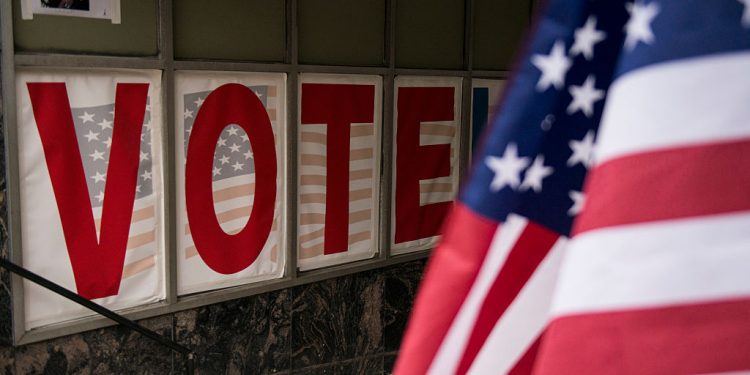Advocacy groups focused on voting rights are urging the Ohio Secretary of State to establish uniformity among the county boards of elections regarding challenges to voter registration.
Advocates are particularly concerned about the Ohio Election Integrity Network, which has been presenting lists of hundreds of voters they claim are ineligible to vote in Ohio to multiple counties. This group’s approach to county boards is not in line with the established process of maintaining voting rolls, which has raised concerns about their methods. The urgency of the situation is further heightened by the fact that these advocates believe that these voters should be removed from the rolls.
Kelly Dufour, who manages voting and elections for Common Cause Ohio, explained that the focus of their efforts is to identify weak points in the election systems and processes that have been in use.
Common Cause Ohio reports that the OEIN and other similar groups are causing “troubling challenges” in various counties. This is affecting the ability of board of elections to carry out election processes and highlighting the differences in resources and workloads among different counties.
During a press briefing on Wednesday, Dufour emphasized the crucial role of election officials. He stated that they are already fulfilling their responsibilities and do not require external interference to ease their workload.
During her observation, she witnessed a voter challenge hearing in Hamilton County that went on for over an hour. The main topic of discussion was a 34-year-old physician who was assigned by her medical school to practice in Kentucky but was still residing with her mother in Ohio.
Dufour recounted how he witnessed an attorney cross-examine a woman about her housing and employment choices. The attorney went as far as asking the woman about jobs she had turned down.
The Licking County Board of Elections received numerous voter registration challenges from OEIN, which caught the attention of advocacy groups. According to a news article from The Reporting Project, OEIN presented “hundreds” of challenges.
During the public comment period of the Montgomery County Board of Elections’ meeting on July 9, Scott Taylor introduced himself as part of a research team in the county for the OEIN. Taylor presented over 50 voter registration challenges made by the group in the county and requested a timeline for when these challenges would be addressed.
Jeff Rezabek, a board director, spoke up right after Taylor’s presentation. He expressed his disappointment with Scott for bringing up these questions in front of the board, calling Scott’s actions “absolutely disingenuous.”
Rezabek confidently stated that the answers are known to him.
During their communication, the director informed the other party that the voters must be notified of the challenge and given an opportunity to either provide proof of residency or confirm that they are no longer residents of Ohio. This exchange took place through multiple emails and phone calls.
During his presentation to the board, he informed them that the OEIN data was limited to the year 2022 only.
According to Rezabek, he is currently awaiting the completion of the change of address verification, which is already in progress, to determine if any of the names have been automatically removed from the system.
During the board meeting, Rezabek stated that those who have not been removed from the ongoing purge process will have to attend a hearing, as per the requirements of the law and its spirit.
The Ohio Voter Rights Coalition, consisting of Common Cause of Ohio, the ACLU of Ohio, and the All Voting is Local’s Ohio chapter, has written a letter to Secretary of State Frank LaRose. The coalition has requested LaRose to provide guidance to the local boards regarding their interactions with these groups.
During a press call on Wednesday, Kayla Griffin, the state director for All Voting is Local, stated that Ohio EIN’s current process is bypassing the voter challenge procedure.
LaRose is being urged to take action by a letter which requests him to issue a directive that disregards voter flags from private groups that do not comply with Ohio law’s provisions. These provisions include the procedure for cancellation, which states that a voter can only be removed after a challenger has signed a form under the penalty of election falsification and after the actual voter has been notified.
During the press briefing and in the letter addressed to LaRose, advocates expressed their dissatisfaction with the decision of the state to withdraw from the Electronic Registration Information Center (ERIC). ERIC is a system utilized by multiple states to share data from motor vehicle registration departments in order to verify voter addresses.
According to a letter from voting rights groups, the Secretary of State’s Office has created a gap in our system by not having (ERIC) in place. This gap has given way to an unsanctioned private organization to carry out a task that rightfully belongs to the state.
OEIN’s website states their support for House Bill 472, a bill introduced by the GOP which is currently under review by the Ohio House Homeland Security Committee. The bill proposes that an elector must possess a state ID or driver’s license to be eligible to vote. Additionally, election officials will be required to compare the elector’s photo ID with their appearance or a photo on file. If there is a mismatch, the elector’s right to vote will be challenged as per the bill’s provisions.
The Capital Journal’s requests for comment from the Secretary of State’s Office and the OEIN were left unanswered.

